|
|
|
Sort Order |
|
|
|
Items / Page
|
|
|
|
|
|
|
| Srl | Item |
| 1 |
ID:
142531
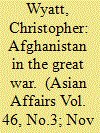

|
|
|
|
|
| Summary/Abstract |
The period of the Great War in Afghanistan was one of the most transformational periods of her entire history. Less than a year after the end of the Great War, both Afghanistan and her relations with the rest of the world had changed forever. The article covers Afghanistan and the outbreak of war, the Niedermayer-Hentig mission from Germany, pressure on the frontier and at court, and the aftermath of the Assassination of Amir Habibullah. At Kabul, the emergence of a ‘War Party’, which favoured the declaration of war on India on the side of the Central Powers, caused difficulties for Habibullah's attempt to remain neutral. Although the War Party was to have some support from the Niedermayer-Hentig Mission to Kabul, it was never strong enough to act until the Great War itself was over. On the other side of the frontier, the tribes were expecting to be called to fight at any moment. Keen to raid into the plains, they initially moved too early and were rebuffed but low-level tribal activity took place all over the frontier, though not at the intensity seen in previous large uprisings. At the same time, the Indian Army was taking out the best troops to send to Europe and other fronts, leaving a comparatively small force to protect the frontier. Large scale response to tribal raiding was not possible but the Indian Army was able to deploy aeroplanes, artillery and machine guns as force multipliers to help make up for the lack of fighting men. The cumulative experience was one of change which needed to be understood and accommodated in short order. Men like Sir Denys Bray of the Foreign Department and Mahmud Tarzi and Abdul Quddus Khan in Kabul were able to do this and, in so doing, facilitated Afghanistan's emergence to independence and nationhood.
|
|
|
|
|
|
|
|
|
|
|
|
|
|
|
|
| 2 |
ID:
134191
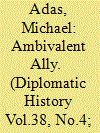

|
|
|
|
|
| Publication |
2014.
|
| Summary/Abstract |
The article focuses on the AEF, entry into WW1; its impact on the allies and revisionist histories of John Pershing's leadership and the outcome of the conflict.
|
|
|
|
|
|
|
|
|
|
|
|
|
|
|
|
| 3 |
ID:
131430
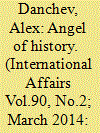

|
|
|
|
|
| Publication |
2014.
|
| Summary/Abstract |
This article explores the way in which art can illuminate war, in particular the Great War. It focuses on Paul Klee's painting, Angelus novus (1920), and the interpretation of that painting by Walter Benjamin, who owned it, in his celebrated theses 'On the concept of history' (1940). Benjamin's interpretation was a kind of parable: he called it the angel of history. Some have taken inspiration from that characterization; others have offered striking alternatives, including Kaiser Wilhelm II and even Adolf Hitler. The article traces the evolution of these identifications; it also considers the continuing artistic response, in historical perspective-notably Anselm Kiefer's The angel of history: poppy and memory (1989). It argues that our conception of the war, and of all wars, is profoundly affected by artistic imagination, and re-imagination.
|
|
|
|
|
|
|
|
|
|
|
|
|
|
|
|
| 4 |
ID:
133874
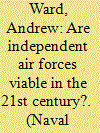

|
|
|
|
|
| Publication |
2014.
|
| Summary/Abstract |
Which modern operations becoming increasingly joint in their nature and airpower now in intrinsic part of every military operation, the need for independent air forces is questioned with special emphasis on the British case
|
|
|
|
|
|
|
|
|
|
|
|
|
|
|
|
| 5 |
ID:
133804
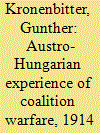

|
|
|
|
|
| Publication |
2014.
|
| Summary/Abstract |
Austria-Hungary's experience of Germany's junior partner was fraught with misunderstandings and a failure to devise a coherent common strategy
While the Anglo-French experience of coalition warfare during the First World War has been the subject of many English-language volumes, Austria-Hungary's relationship with Germany - its senior partner within the Triple Alliance - has been underexplored. In this article, Günther Kronenbitter analyses the uneasy dynamics of this alliance, tracing it through the two countries' wilfully blinkered, thirty-year preparations for a war that eventually came in August 1914, before exploring their increasingly fraught and inadequate efforts to co-ordinate their campaigns and resources - a process marked by resentment and, more importantly, a failure to take a unified strategic approach.
|
|
|
|
|
|
|
|
|
|
|
|
|
|
|
|
| 6 |
ID:
133061
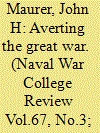

|
|
|
|
|
| Publication |
2014.
|
| Summary/Abstract |
Winston Churchill is best remembered as a valiant leader in times of war. He should also be remembered, however, for his efforts to prevent the catastrophic great wars that would scar the history of the twentieth century. While it is largely forgotten today, on the eve of the First World War Churchill made a remarkable attempt to halt the head-to-head competition in naval armaments that was setting Great Britain and Germany against one another as adversaries. In a bold and unconventional initiative, Churchill invited Germany's rulers to take a "holiday" from the competitive building of battleships. As the civilian head of Britain's Royal Navy, Churchill made public appeals for a naval holiday on three separate occasions before 1914. Behind the scenes too he pressed for the opening of negotiations with Germany, using the holiday proposal as the starting point for discussions. It was Churchill's earnest hope that the naval holiday would stop the action-reaction dynamic of the arms race-what statesmen of that era called "the sea war waged in the dockyards"-and reduce the antagonism between Britain and Germany. Rather than letting Britain and Germany be arrayed in opposing camps, he wanted to promote cooperation between Europe's two leading great powers.
|
|
|
|
|
|
|
|
|
|
|
|
|
|
|
|
| 7 |
ID:
181102
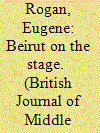

|
|
|
|
|
| Summary/Abstract |
In the immediate aftermath of the First World War, two nationalist theatre companies in Beirut staged a new play in 1919 encapsulating the civilian hardships of four years of the war. While little is known of the author, George Murad, details from the preface and dedication to the printed edition would situate him among pro-French Maronite Christians seeking independence for a greater Lebanon under French protection. The play, “Beirut on the Stage,” would appear to have been an example of political theatre seeking to validate the wartime suffering of Lebanese Christians through a vision of independence that, by the time the play was published in 1920, had already been undermined by French measures to colonise, rather the liberate, Greater Lebanon.
|
|
|
|
|
|
|
|
|
|
|
|
|
|
|
|
| 8 |
ID:
134088


|
|
|
|
|
| Publication |
2014.
|
| Summary/Abstract |
One reason why Europe went to war in 1914 is that all of the continental great powers judged it a favorable moment for them to fight, and all were more pessimistic about postponing the fight until later. Not only is this historical paradox an interesting puzzle in its own right, but it sheds light on what is arguably the reigning theory of the causes of wars in general: James Fearon's rational bargaining theory. None of Fearon's three main mechanisms-private information, commitment problems, or indivisibility of stakes-can explain the paradox of the universal, simultaneous view of 1914 as a favorable year for war. Two mechanisms that play a marginal role in his analysis, however-bounded rationality in multidimensional power assessments and attempts to mitigate power shifts through coercive diplomacy-help to explain how Europe's powers became trapped in a choice between war now and war later. These mechanisms were set in motion by background strategic assumptions rooted in the culture of militarism and nationalism that perversely structured the options facing Europe's political leaders in 1914. Whereas Fearon's theory assumes that states are paying equal attention to all relevant information, in 1914 each power's strategic calculations produced disproportionate levels of self-absorption in its own domestic concerns and alliance anxieties.
|
|
|
|
|
|
|
|
|
|
|
|
|
|
|
|
| 9 |
ID:
186285
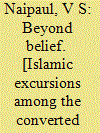

|
|
|
|
|
| Publication |
London, Picador, 2010.
|
| Description |
vii, 435p.pbk
|
| Standard Number |
9780330517874
|
|
|
|
|
|
|
|
|
|
|
|
Copies: C:1/I:0,R:0,Q:0
Circulation
| Accession# | Call# | Current Location | Status | Policy | Location |
| 060204 | 297/NAI 060204 | Main | On Shelf | General | |
|
|
|
|
| 10 |
ID:
134198
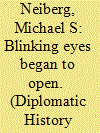

|
|
|
|
|
| Publication |
2014.
|
| Summary/Abstract |
This article examines American reactions to the First World War from 1914 to American belligerence in 1917. Despite Woodrow Wilson's plea for Americans to be neutral, they had strong reactions to the war. These reactions led to three important legacies in America's dealings with the rest of the world.
|
|
|
|
|
|
|
|
|
|
|
|
|
|
|
|
| 11 |
ID:
133799
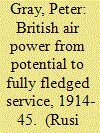

|
|
|
|
|
| Publication |
2014.
|
| Summary/Abstract |
The First World War set British air power on a path of development that by 1939 made an essential contribution to the conduct of war
At the start of the First World War, the potential of air power for military purposes had already been identified but remained largely underdeveloped, with Britain lagging behind some of its direct European competitors. Peter Gray traces how the First World War acted as a catalyst for British forces to use air power in attack and reconnaissance roles, and unleashed the potential for its further development during the interwar years. By the Second World War, air power had become an indispensable element of warfare.
|
|
|
|
|
|
|
|
|
|
|
|
|
|
|
|
| 12 |
ID:
133798
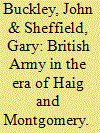

|
|
|
|
|
| Publication |
2014.
|
| Summary/Abstract |
Negative myths about the British Army's performance, especially during the Great War, obscure the reality of an institution that learned and improvide throughout both world wars
The performance of the British Army in the two world wars has been the subject of much scrutiny in both scholarly and popular history. The latter has long been dominated by the perception of an underperforming army fighting under incompetent leadership in a futile First World War, in contrast to a more successful and effective force supporting a just cause in the Second. Yet, John Buckley and Gary Sheffield argue, sound scholarly research paints a much more nuanced picture of an institution that between 1914 and 1945 underwent a rich learning process that must be understood in its entirety.
|
|
|
|
|
|
|
|
|
|
|
|
|
|
|
|
| 13 |
ID:
133800
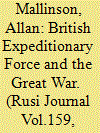

|
|
|
|
|
| Publication |
2014.
|
| Summary/Abstract |
A counterfactual account of what Britain's leaders could have done prior to the Great War to prepare the country more effectively for fighting a European land war
The decision-making of Britain's political and military leaders in August 1914 has been subject to much scrutiny in the intervening century. Allan Mallinson argues vehemently that the wrong decisions were taken in the years preceding the outbreak of the conflict, and presents a counterfactual of what Britain's experience could have been had conscription been introduced or sounder preparations for a land engagement been made before 1914.
|
|
|
|
|
|
|
|
|
|
|
|
|
|
|
|
| 14 |
ID:
131779
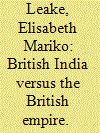

|
|
|
|
|
| Publication |
2014.
|
| Summary/Abstract |
From the end of the Great War to the onset of the Second World War, Great Britain and British India clashed over the Indian Army's role in imperial defence. Britain increasingly sought an imperial fighting force that it could deploy across the globe, but the government of India, limited by the growing independence movements, financial constraints, and-particularly-renewed tribal unrest on its North-West Frontier, refused to meet these demands. Attempts to reconcile Britain's and India's conflicting strategies made little headway until the late 1930s when compromise ultimately emerged with the establishment of the Expert Committee on the Defence of India 1938-39. While the Committee refuted India's traditional focus on the subcontinent's own security, importantly it recognized the necessity of British financial support for the Indian Army and the maintenance of a large local fighting force to prevent North-West Frontier unrest from disrupting imperial military planning at a time of global war.
|
|
|
|
|
|
|
|
|
|
|
|
|
|
|
|
| 15 |
ID:
100427


|
|
|
|
|
| Publication |
2010.
|
| Summary/Abstract |
History has relegated much of the Great War's Liberal literature to the realm of romanticism, but Montague and others were in fact deeply political. Montague's criticisms of the Paris peace treaties and of British politicians, together with his demand for greater respect for those who had fought, helped shape the way the war was both perceived and remembered in Britain.
|
|
|
|
|
|
|
|
|
|
|
|
|
|
|
|
| 16 |
ID:
133802
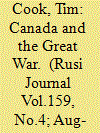

|
|
|
|
|
| Publication |
2014.
|
| Summary/Abstract |
Britain's war effort was crucially aided by its Dominions, with Canada's experience of the First World War a prime example of this fundamental military contribution
Canada's contribution to the war effort on the Western Front was of fundamental importance throughout the Great War. Tim Cook traces how, over four years, what started as a little-organised contingent of 31,000 troops of mostly citizen-soldiers grew into an effective fighting force that made significant contributions to the final victory over the Central Powers.
|
|
|
|
|
|
|
|
|
|
|
|
|
|
|
|
| 17 |
ID:
143071


|
|
|
| 18 |
ID:
172256
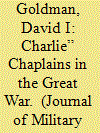

|
|
|
|
|
| Summary/Abstract |
Following World War I, the U.S. Army began drafting a comprehensive history of its wartime activities, including a section on chaplains, but by 1920 the project had fallen victim to a wave of budget cuts. What remained of the chaplain’s portion was an incredibly rich collection of letters, photos, and documents compiled by a group of chaplains tasked with writing the section. The author came across these little-used files, and he has used them as the basis to tell a part of the story of the priests, reverends, and rabbis who decided to serve both their nation and denominations in the war.
|
|
|
|
|
|
|
|
|
|
|
|
|
|
|
|
| 19 |
ID:
131285


|
|
|
| 20 |
ID:
118671


|
|
|
|
|
| Publication |
2012.
|
| Summary/Abstract |
This article investigates the lack of Russian-language monographs about the Russian participation in the First World War. Discussing a number of recent and older works that have been published, the article suggests that the surprising lack of Russian interest has much to do with the continued unease felt in Russia about the Great War. This does not fit into the heroic image Russians (and particularly the current government) prefer to cherish about their past. The article in addition supplies the reader with a fairly comprehensive overview of recent English-language as well as Soviet, émigré, and post-Soviet Russian-language works on Russia in the Great War.
|
|
|
|
|
|
|
|
|
|
|
|
|
|
|
|
|
|
|
|
|